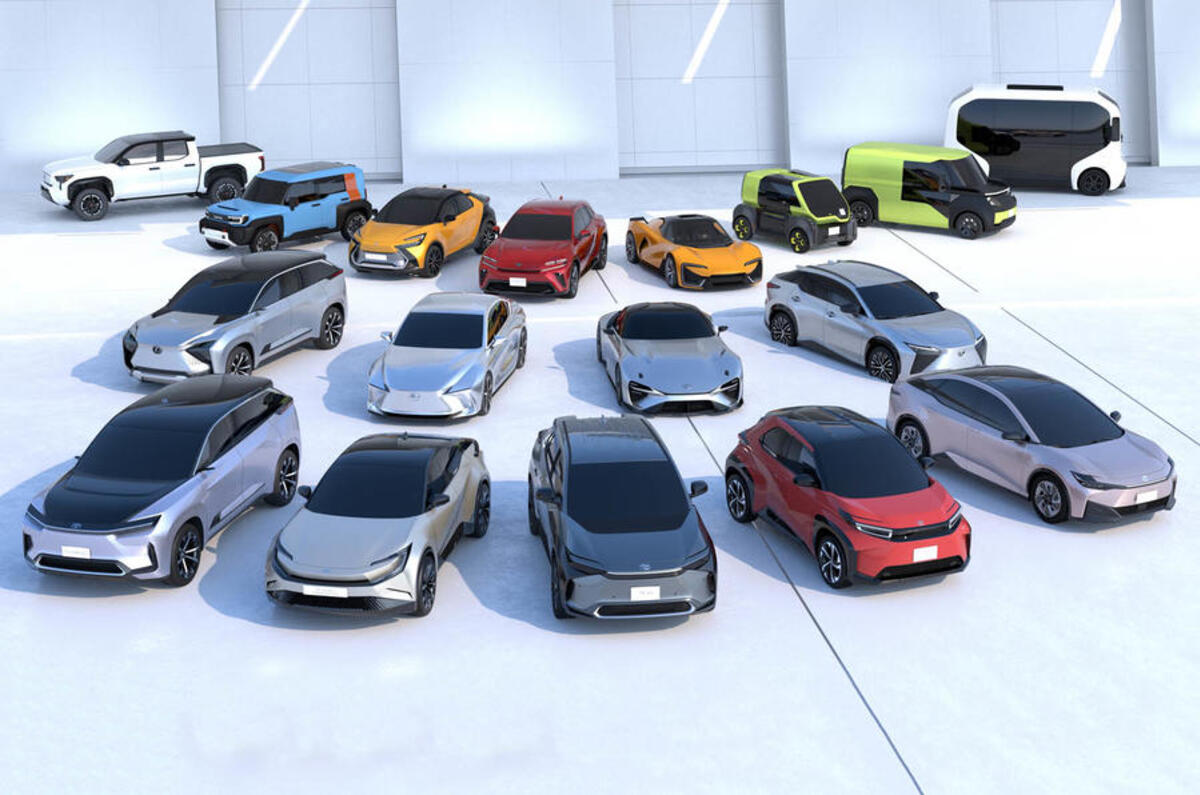Toyota’s decision to unveil an entire motor show’s worth of new cars in a single presentation yesterday was as remarkable a public insight into a company’s future model plans as any in living memory.
It’s one thing to say the cars you’ll be making in the future, quite another to show them all. Unprecedented, even. The best we could muster in the Autocar office was Dany Bahar’s Lotus a decade ago, when seven concepts were unveiled at the Paris motor show – about as unfair a comparison to what Toyota has done as Peckham Spring to champagne.
This is the way now at Toyota, a company that only a decade ago was about as large a corporate machine as you could imagine but is now a car maker packed full of surprises and bold statements backed up with actions, all in the image of its leader, Akio Toyoda.
Toyota is not a brand to dip its toe into something to see how it goes. It goes in big, having carefully weighed up the merits of doing so to avoid merely jumping on a bandwagon.
To that end, there had been rumblings that Toyota had been slow to move towards full electrification, something that legislation has made an inevitability. Yet those rumblings will be no more after the unveiling of the 15 concept cars that are likely to form the basis of many of the production cars needed for Toyota to hit its target of selling 3.5 million electric cars per year by 2030. Toyoda said he is now "interested in future EVs”, having not been so until now.
It was also announced that Lexus would be an electric-only brand in Europe by 2030 and everywhere by 2035, a logical step given its market positioning. Intriguingly, though, the same will not happen to Toyota.
Toyoda said his firm is not yet wholly sure what the ultimate uptake and technology direction will be for electric cars and, as such, is keeping all future technology options on the table to respond to the needs of customers as different solutions emerge.
For example, Toyota is still very much backing hydrogen as a fuel of the future, and the company’s engineering prowess and influence over Japanese industrial strategy gives that fuel a high chance of more widespread commercial success and uptake in the longer term.
Toyota is unlikely to want to turn its back on more than two decades of development of hybrid technology, either, which it remains convinced offers significant emissions benefits at a much lower cost.
It’s telling that here in the UK, the ‘meaningful’ electric range of a hybrid to allow them to stay on sale for five years after 2030 is yet to be announced, which we understand is in part due to Toyota’s influence and research in showing the real-world emissions benefits of its hybrid technology used in cars it manufactures in the UK.
Hydrogen and hybrids aren’t the only options, either, as Toyota is one of several major car makers investigating e-fuels. “Banning internal combustion engines might be picking a fight with the wrong enemy,” Steve Sapsford, managing director of consultancy firm SCE, told a recent Autocar Business webinar on the topic. “Stopping our dependence on fossil fuels is where we should be focused.”








Join the debate
Add your comment
Just a rehash of an announcement Toyota made in 2019. As for e-fuels that's another fantasy project by ICE vested interests
I dont believe that Toyota think the EV is a car they can make yet, and sell at a profit. I think that is why they have gone so slowly with their own EVs. I think the cars shown here are to let people know that something is coming, but even 3.5 million a year by 2030 will be quite a small percentage of what they actually make. Apart from EV mad Europe the world wide take up of EVs is likley to be quite slow as they are likely to remain expensive, compromised in range, or both for a very long time to come.
But at least there is some hope that not everything in the future will be dull, tall and heavy with the posibility of an MR2 replacement in their future portfolio.
If you can't make EVs at a profit now, you won't be able to make them at a profit later when competing against those whove already gone through that process for the past 10 years.
Tesla were able to do this on VC money and frankly massive risks that established companies wouldn't be prepared to take. Some of the other companies which might survive the EV transition will be prepared to not make money on EVs and cross subsidies from ICE sales.
This issue is that at some stage ICE vehicle demand will drop off a cliff as far fewer people will want to buy a car that is obsolete, may be heavily taxed in the future or banned from going into certain locations. Given that the whole lease market is based on an assumed future value ICE cars may be hit particulary hard if residuls are uncertain.
When ICE demand does drop off there will be no ICE vehicles to cross subsides against, plus they will have ICE vehicle manufacturing facilities that need to be expensively converted plus supply chains set up to buy unecessary components while having to compete with everybody else for batteries and motor components.
Toyota will be trying to pull this off while clearly not having everybody on board with electrification.
To put 3.5 million in context that is where Tesla will be by some time in 2023.
China are quite keen on EVs, they're far ahead of Europe in sales.
Arguably they have promoted the series hybrid 'Prius' powertrain for too long and may have already lost the EV advantage to VW group, Hyundai and others.
Good to see they have proper EV's coming down the line, but it's hardly a 'shock' from the worlds biggest carmaker.